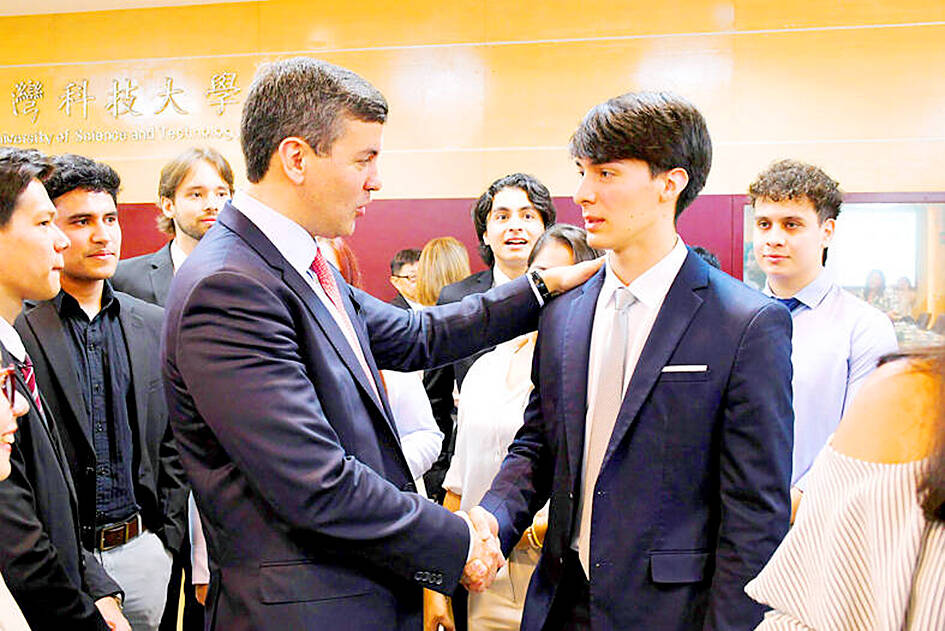Starting next year, young Taiwanese can apply for individual subsidies of up to NT$2 million (US$61,453) for internships abroad as part of an Executive Yuan program approved yesterday.
The four-year program proposed by the Ministry of Education was approved at the weekly Cabinet meeting.
It was one of the pledges President William Lai (賴清德) made when running for president.

Photo from the iYouth Web site
People aged 15 to 30 would be qualified to apply, the ministry said.
They can propose projects that would take two weeks to one year to complete, with each person receiving no more than NT$2 million, it said.
The government would allocate NT$1 billion to cover the first year of the program, followed by NT$2 billion in 2026, NT$3 billion in 2027 and NT$4 billion in 2028, it said.

Photo: CNA
At most 550 people would receive funding next year, the ministry said.
Applicants have three options, Deputy Minister of Education Yeh Ping-cheng (葉丙成) said.
The first would allow them to propose the goal they want to achieve in foreign countries and their action plan, he said.
Aside from funding, the ministry would also provide resources to help them achieve their dreams, he added.
“We hope to help 200 people fulfill their dreams in foreign countries, particularly those who are from underprivileged families,” Yeh said.
The second option would be to receive funding to sponsor study, work or travel overseas, such as internships in international organizations, foundations or think tanks, Yeh said.
For example, young people aged 18 to 30 could study animal conservation in a zoo in Japan or serve as interns at a start-up campus in Paris, while those aged 15 to 18 can study in culinary schools in Italy, work in an environmental protection organization in Sweden or participate in exchange activities that allow them to visit the US Major League Baseball league or other organizations, the ministry said.
It said it plans to sponsor 350 people who choose this track.
The third option would be to participate in flagship initiatives organized by government agencies in Taiwan, Yeh said, adding that 60 of the 550 spots available during the first year would be reserved for such participants.
For next year, young people would be able to participate in the government’s zero carbon emissions initiative organized by the Ministry of Education and the Ministry of Environment, which would allow them to visit groups advocating sustainability in developed nations, he said.
The Cabinet also approved a proposal from the Ministry of Economic Affairs to spend NT$500 million in the next four years to improve the economy and upgrade facilities in 368 towns across the country.
The economic ministry’s plan has two parts, the Cabinet said.
First, towns would recommend industries and services that represent their localities, which would be reviewed by the economics ministry.
Once the ministry selects industry highlights, it would divert resources to improve and promote them through domestic and international marketing channels.
The second part would be to hold a national competition to evaluate the shopping, food and travel experience in cities and towns across the country.
In other news, the Executive Yuan approved the proposed amendments to Customs Import Tariff Act (海關進口稅則) including removing tariffs on boneless pork, plastic bottles, socks and 14 other goods from Paraguay.
Tariff on rice crackers would be reduced to 10 percent, while those on honey would gradually drop to 20 percent over the next three years.
The draft amendments would take effect within 30 days of both countries completing legislative procedures, the Ministry of Finance said.

AT RISK: The council reiterated that people should seriously consider the necessity of visiting China, after Beijing passed 22 guidelines to punish ‘die-hard’ separatists The Mainland Affairs Council (MAC) has since Jan. 1 last year received 65 petitions regarding Taiwanese who were interrogated or detained in China, MAC Minister Chiu Chui-cheng (邱垂正) said yesterday. Fifty-two either went missing or had their personal freedoms restricted, with some put in criminal detention, while 13 were interrogated and temporarily detained, he said in a radio interview. On June 21 last year, China announced 22 guidelines to punish “die-hard Taiwanese independence separatists,” allowing Chinese courts to try people in absentia. The guidelines are uncivilized and inhumane, allowing Beijing to seize assets and issue the death penalty, with no regard for potential

STILL COMMITTED: The US opposes any forced change to the ‘status quo’ in the Strait, but also does not seek conflict, US Secretary of State Marco Rubio said US President Donald Trump’s administration released US$5.3 billion in previously frozen foreign aid, including US$870 million in security exemptions for programs in Taiwan, a list of exemptions reviewed by Reuters showed. Trump ordered a 90-day pause on foreign aid shortly after taking office on Jan. 20, halting funding for everything from programs that fight starvation and deadly diseases to providing shelters for millions of displaced people across the globe. US Secretary of State Marco Rubio, who has said that all foreign assistance must align with Trump’s “America First” priorities, issued waivers late last month on military aid to Israel and Egypt, the

‘UNITED FRONT’ FRONTS: Barring contact with Huaqiao and Jinan universities is needed to stop China targeting Taiwanese students, the education minister said Taiwan has blacklisted two Chinese universities from conducting academic exchange programs in the nation after reports that the institutes are arms of Beijing’s United Front Work Department, Minister of Education Cheng Ying-yao (鄭英耀) said in an exclusive interview with the Chinese-language Liberty Times (the Taipei Times’ sister paper) published yesterday. China’s Huaqiao University in Xiamen and Quanzhou, as well as Jinan University in Guangzhou, which have 600 and 1,500 Taiwanese on their rolls respectively, are under direct control of the Chinese government’s political warfare branch, Cheng said, citing reports by national security officials. A comprehensive ban on Taiwanese institutions collaborating or

France’s nuclear-powered aircraft carrier and accompanying warships were in the Philippines yesterday after holding combat drills with Philippine forces in the disputed South China Sea in a show of firepower that would likely antagonize China. The Charles de Gaulle on Friday docked at Subic Bay, a former US naval base northwest of Manila, for a break after more than two months of deployment in the Indo-Pacific region. The French carrier engaged with security allies for contingency readiness and to promote regional security, including with Philippine forces, navy ships and fighter jets. They held anti-submarine warfare drills and aerial combat training on Friday in